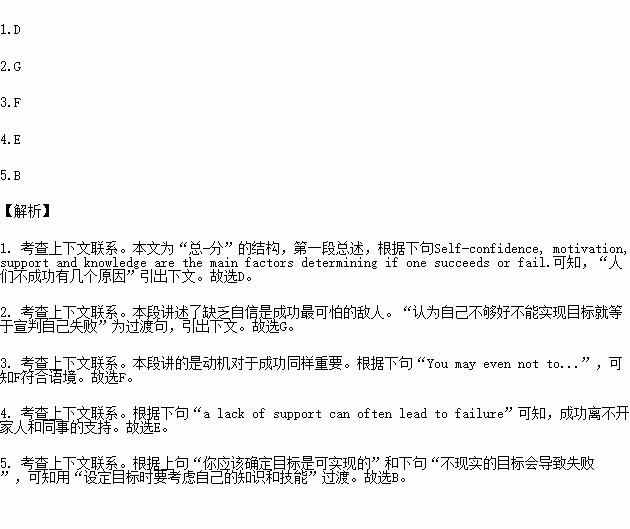题目内容
阅读填空
Self-confidence, motivation, support and knowledge are the main factors determining if one succeeds or fails. Each of these factors influences our chances of success in a different way. 1..
Lack of self-confidence is probably the most dreadful enemy of success. 2. Even the most capable person is sure to fail with such an attitude. If it is your case too, improving your self-confidence is a must.
Motivation is equally as important as self-confidence. 3. You may even not try to achieve the goal that lies before you. It is important to find out what is the best motivation for you. If you have to do something that does not motivate you, just treat yourself with a reward after you succeed. Of course, this reward should consist of something that will motivate you to pursue(追求) a success.
4. While it is not a must for succeeding in your goals, a lack of support can often lead to failure. It is also true that some people cannot succeed without a proper support from their surroundings. These people often lose their motivation or worse, their self-confidence. If you know such a person, supporting him or her is a right thing to do. Also surround yourself with the right people. You will see the results soon.
Pursuing realistic goals is also important for a success. You should always make sure that your goals are achievable. 5. Unrealistic goals usually lead to a fast failure and also make many people embarrassed.
A. As we know, many people try but do not succeed.
B. Consider all your knowledge and skills when setting up a goal.
C. Motivation is something in yourself that can push you forwards.
D. There are several main reasons why some people cannot succeed.
E. Supportive family and collective workplace are also very important.
F. Without it, you will not push yourself towards a better performance.
G. Thinking you are not good enough to achieve your goals is the same as deciding that you will not succeed.
书面表达
Directions: Write an English composition according to the instructions given below.
请以老师当众表扬你为话题,用所给的句子为开头,续写一篇英语短文,内容包括:
1. 老师因何事表扬你; 2. 你受表扬时的心情; 3. 此次经历给你带来的变化。
As a student, I can tell you that there is nothing better than being praised by my teacher before my classmates. The other day, … |
注意: 续写词数 100个左右。

